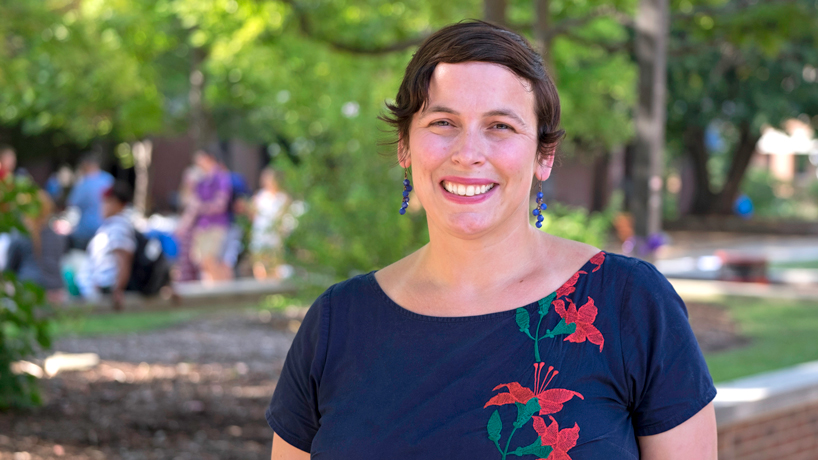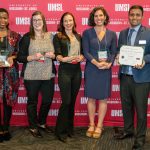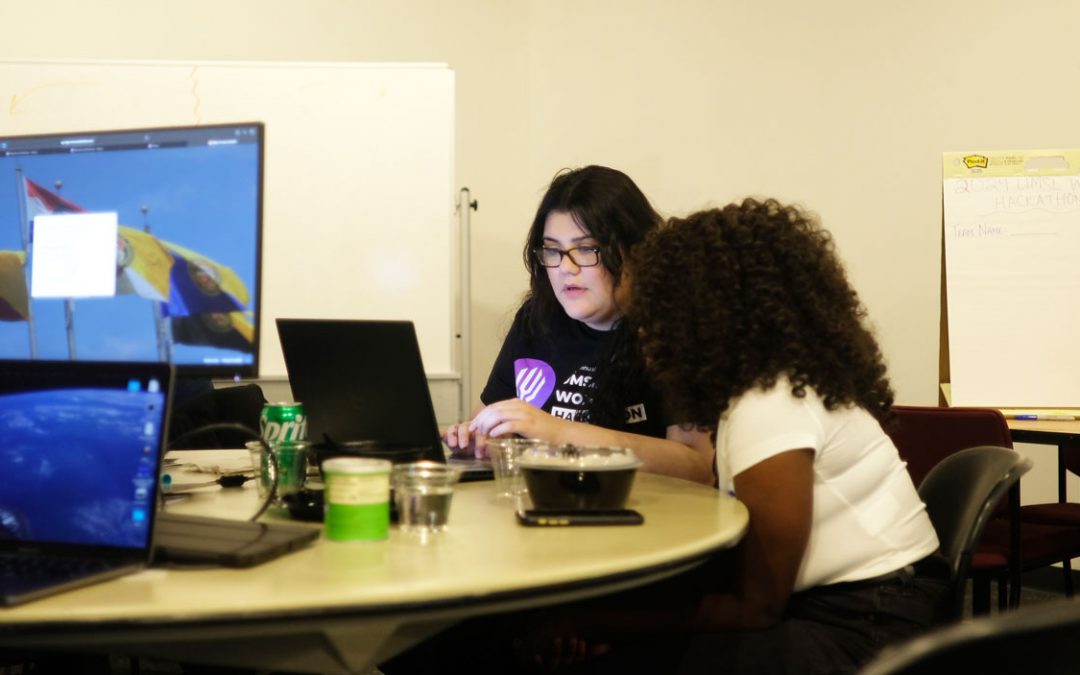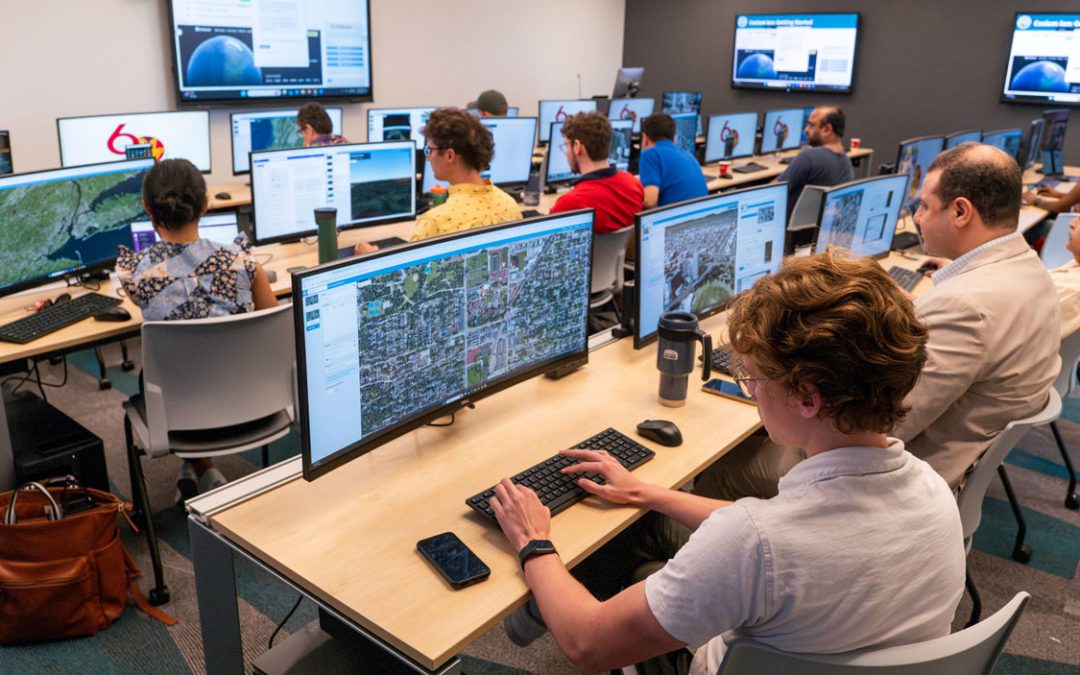
Students and “what their words can do” drive composition and rhetoric courses taught by UMSL Assistant Professor of English Lauren Obermark, recipient of this year’s Gerald and Deanne Gitner Excellence in Teaching Award. (Photo by August Jennewein)
Lauren Obermark is well acquainted with the dreary associations that too often surround required writing courses. She chooses to teach them anyway, eager to tackle the inherent challenges of college composition.
“It’s one of the few places that students get to think in big ways and try new things with their writing or other forms of composing,” said Obermark, a University of Missouri–St. Louis assistant professor of English. “I make it my goal for them to leave my class understanding how language really is an important part of their realities and identities, and it will continue to be even when their school days are long behind them.”
According to her students and colleagues, Obermark is achieving that goal and then some. Her effectiveness in the classroom makes her the recipient of the 2015 Gerald and Deanne Gitner Excellence in Teaching Award, which will be presented with a plaque and a $500 honorarium during the annual State of the University Address on Sept. 16 in the J.C. Penney Building.
“Sometimes teaching feels like this invisible part of our job, even though it’s what I spend so much of my time designing and doing,” said Obermark, who is beginning her third year on UMSL’s faculty. “So having it recognized in a formal way feels really good.”
Adept at developing even the most reluctant students into writing enthusiasts, Obermark instills in them pride and hope as they make strides in her class, colleagues said.
“She has shown them that writing is not an exotic, difficult art practiced by a select few,” wrote UMSL Founders Professor of English Richard Cook in a nomination letter, “but an attainable (and necessary) skill that they can master and take with them into all areas of their studies as well as into future employment.”
Along with detailed feedback and demanding expectations, Obermark’s writing and rhetoric courses are characterized by civic engagement, putting students in conversation not only with each other but within larger, public spheres of discourse and current events. That emphasis comes naturally to her chosen field of study, Obermark noted.
“Aristotle was aware that people needed to be using language in effective ways for political and civic purposes, so the roots of the discipline are already based in that interest,” she said. “Also, rhetoric is an inherently interdisciplinary field. So we get to look at feminist criticism, we get to look at perspectives from disability studies, African American theories of rhetoric … and another goal of rhetoric obviously is to persuade people – and to solve some problems and to use dialogue to make a difference.”
Obermark’s students – both undergraduates and graduate students – find themselves challenged in new ways, regardless of skill level. Jane Shasserre, who completed an online section of English 3100 taught by Obermark last year, said she was amazed at all that she learned. A longtime communication professional herself, Shasserre had expected it to be “ordinary – a walk in the park,” given her extensive experience.
“When I registered for my required junior-level writing course at UMSL,” she wrote in a letter supporting Obermark’s nomination for the Gitner award, “I had no idea that I was about to begin a journey that would change the way I define literacy, lead me to appreciate the value of collaboration, help me to discover how connected I am to where I grew up and offer me the opportunity to see my own family’s literacy experience in a different light.”
Students frequently remark on the helpfulness and depth of Obermark’s feedback on their writing, pleasantly surprised to find detailed in-text comments and full pages of thoughts in response to their work.
“It’s the most time-consuming but the most important part of my teaching – the time I spend with their writing and the ways I respond to their writing,” Obermark said.
Asked what fuels her pedagogy and the energy she brings to the classroom, she said she “can’t help but put a lot of time and thought” into her teaching.
“Part of the reason is because you get immediate feedback and you’re immediately held accountable,” she said. “It’s one of the few things in my career where I know right away whether I’m doing a good or bad job… When I submit a journal article it might be six months before I hear anything, but with students, I like that immediate response from students.”
College of Arts and Sciences Dean Ron Yasbin noted in a nomination letter that Obermark “has established a reputation as an exciting, challenging and technologically innovative teacher” in her short time at UMSL.
“Rigorous in her expectations, versatile in the range of her interests and highly effective in her instructional techniques,” Yasbin wrote, “she has instilled new interest in UMSL’s rhetoric and writing programs.”
Obermark is quick to acknowledge how her students have challenged and inspired her, too.
“Being at UMSL and having students from so many different backgrounds and different experiences – and this is true of undergraduate and graduate students, coming from all sorts of different places in their lives – that has been probably one of the more transformative things for my teaching,” she said. “They’re really thoughtful and also really critical and challenge my own assumptions. The students help me evolve as a teacher.”















